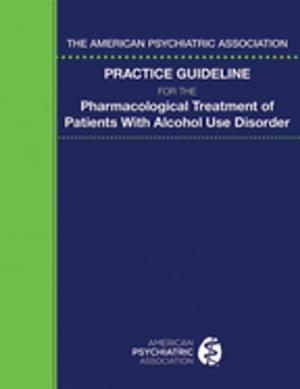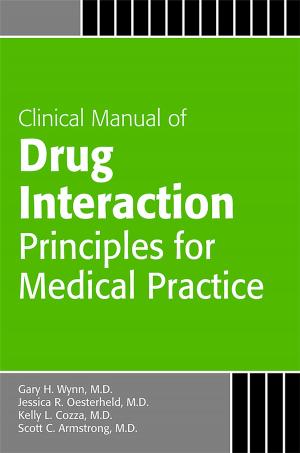| Author: | John M. Oldham, MD MS, Michelle B. Riba, MD MS | ISBN: | 9781585627066 |
| Publisher: | American Psychiatric Publishing | Publication: | May 3, 2007 |
| Imprint: | American Psychiatric Association Publishing | Language: | English |
| Author: | John M. Oldham, MD MS, Michelle B. Riba, MD MS |
| ISBN: | 9781585627066 |
| Publisher: | American Psychiatric Publishing |
| Publication: | May 3, 2007 |
| Imprint: | American Psychiatric Association Publishing |
| Language: | English |
Psychiatric Genetics is a concise reference that presents the complexities of this dynamic field in a clearly written, easily accessible format, with numerous tables and illustrations. Ten expert contributors offer a fascinating view of psychiatric genetics in a text that is thorough and scholarly yet also succinct and accessible.
The introduction summarizes the field's four distinct paradigms -- and their interrelationships -- that help us understand the role of genetic factors in the etiology of psychiatric disorders: basic genetic epidemiology, which demonstrates heritability; advanced genetic epidemiology, which explores the nature and mode of action of these genetic risk factors; gene finding, which enables us to infer the probability that a locus in the genomic region under investigation contributes to psychiatric disorder liability; and molecular genetics, which traces the biological mechanisms by which the DNA variant identified using gene finding methods contributes to the disorder itself.
Psychiatric Genetics illustrates the importance of Appreciating the complex field of psychiatric genetics -- Presents the major conceptual and statistical issues in psychiatric genetics, including many of the basic principles of both genetic epidemiology and gene finding, as well as a brief review of DNA itself. Detailing the results for one disorder where substantial progress had been made in gene finding and molecular genetics -- Covers schizophrenia, because of the substantial progress made during the past few years. Presenting results for a more typical and common set of psychiatric disorders where most of our information comes from basic and advanced genetic epidemiology and where we are just beginning to make advances using gene finding -- Discusses anxiety disorders, which illustrate these sets of issues. Covering disorders where major advances have been made using basic and advanced genetic epidemiology -- Details substance use disorders, where the paradigm has shifted from sociological to genetic factors and where, in contrast to the genetics of more traditional psychiatric disorders, researchers must consider the inherent conditionality of drug abuse. Investigating the role of genetics in personality disorders -- Focuses on the development of conduct and antisocial behavior and how to incorporate developmental processes into analyses of the role of genetics.
Psychiatric Genetics draws students, educators, and practitioners alike into the exciting world of psychiatric genetics with a lively discussion of its broad trends and of the strengths and limitations of its methods to provide true insight into the etiology of psychiatric and substance use disorders.
Psychiatric Genetics is a concise reference that presents the complexities of this dynamic field in a clearly written, easily accessible format, with numerous tables and illustrations. Ten expert contributors offer a fascinating view of psychiatric genetics in a text that is thorough and scholarly yet also succinct and accessible.
The introduction summarizes the field's four distinct paradigms -- and their interrelationships -- that help us understand the role of genetic factors in the etiology of psychiatric disorders: basic genetic epidemiology, which demonstrates heritability; advanced genetic epidemiology, which explores the nature and mode of action of these genetic risk factors; gene finding, which enables us to infer the probability that a locus in the genomic region under investigation contributes to psychiatric disorder liability; and molecular genetics, which traces the biological mechanisms by which the DNA variant identified using gene finding methods contributes to the disorder itself.
Psychiatric Genetics illustrates the importance of Appreciating the complex field of psychiatric genetics -- Presents the major conceptual and statistical issues in psychiatric genetics, including many of the basic principles of both genetic epidemiology and gene finding, as well as a brief review of DNA itself. Detailing the results for one disorder where substantial progress had been made in gene finding and molecular genetics -- Covers schizophrenia, because of the substantial progress made during the past few years. Presenting results for a more typical and common set of psychiatric disorders where most of our information comes from basic and advanced genetic epidemiology and where we are just beginning to make advances using gene finding -- Discusses anxiety disorders, which illustrate these sets of issues. Covering disorders where major advances have been made using basic and advanced genetic epidemiology -- Details substance use disorders, where the paradigm has shifted from sociological to genetic factors and where, in contrast to the genetics of more traditional psychiatric disorders, researchers must consider the inherent conditionality of drug abuse. Investigating the role of genetics in personality disorders -- Focuses on the development of conduct and antisocial behavior and how to incorporate developmental processes into analyses of the role of genetics.
Psychiatric Genetics draws students, educators, and practitioners alike into the exciting world of psychiatric genetics with a lively discussion of its broad trends and of the strengths and limitations of its methods to provide true insight into the etiology of psychiatric and substance use disorders.















